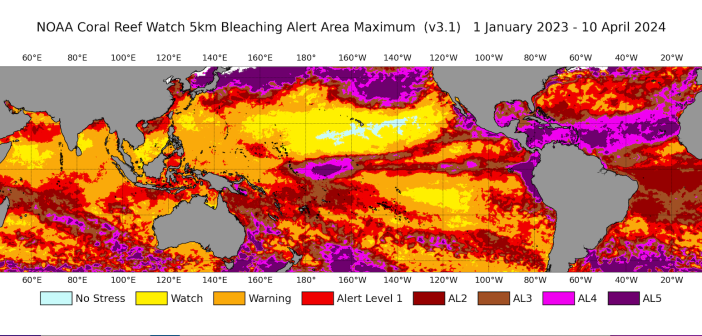Here’s the latest from NOAA on the mass bleaching of coral reefs around the world:
The world is currently experiencing a global coral bleaching event, according to NOAA scientists. This is the fourth global event on record and the second in the last 10 years.
Bleaching-level heat stress, as remotely monitored and predicted by NOAA’s Coral Reef Watch (CRW), has been — and continues to be — extensive across the Atlantic, Pacific and Indian Ocean basins. CRW’s heat-stress monitoring is based on sea surface temperature data, spanning 1985 to the present, from a blend of NOAA and partner satellites.
“From February 2023 to April 2024, significant coral bleaching has been documented in both the Northern and Southern Hemispheres of each major ocean basin,” said Derek Manzello, Ph.D., NOAA CRW coordinator.
Since early 2023, mass bleaching of coral reefs has been confirmed throughout the tropics, including in Florida in the U.S.; the Caribbean; Brazil; the eastern Tropical Pacific (including Mexico, El Salvador, Costa Rica, Panama and Colombia); Australia’s Great Barrier Reef; large areas of the South Pacific (including Fiji, Vanuatu, Tuvalu, Kiribati, the Samoas and French Polynesia); the Red Sea (including the Gulf of Aqaba); the Persian Gulf; and the Gulf of Aden.
NOAA has received confirmation of widespread bleaching across other parts of the Indian Ocean basin as well, including in Tanzania, Kenya, Mauritius, the Seychelles, Tromelin, Mayotte and off the western coast of Indonesia.
“As the world’s oceans continue to warm, coral bleaching is becoming more frequent and severe,” Manzello said. “When these events are sufficiently severe or prolonged, they can cause coral mortality, which hurts the people who depend on the coral reefs for their livelihoods.”
Coral bleaching, especially on a widespread scale, impacts economies, livelihoods, food security and more, but it does not necessarily mean corals will die. If the stress driving the bleaching diminishes, corals can recover and reefs can continue to provide the ecosystem services we all rely on.
“Climate model predictions for coral reefs have been suggesting for years that bleaching impacts would increase in frequency and magnitude as the ocean warms,” said Jennifer Koss, director of NOAA’s Coral Reef Conservation Program (CRCP).
Read more at https://www.noaa.gov/news-release/noaa-confirms-4th-global-coral-bleaching-event




